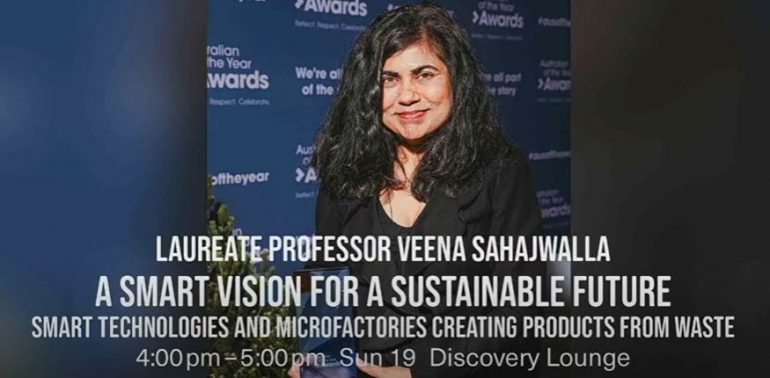Latest news
Read the latest news from the Centre for Sustainable Materials Research and Technology

See the video of Veena delivering a keynote speech and joining a panel discussion at the Disrupted Festival of Ideas 2022 hosted by the Western Australian Government on 19 June 2022.
Veena delivered a keynote entitled "A Smart Vision for a Sustainable Future" talking about the need for greater innovation in waste, recycling and manufacturing using waste as a resource, highlighting some of her UNSW SMaRT Centre innovations.
Veena also joined a panel to talk about "sustainable fashion" and how to reduce clothing waste and be more sustainable in our solutions.
The event, hosted by the State Library of Western Australia, was livestreamed. See the below recording with the panel discussion taking place at 3:15:48 and the keynote at 6:11:09:
Pre-event information:
Fashion – it dictates what we wear, where we buy and what we think of others. With consumer demands driving fast fashion, the industry has been left with the challenge of efficacy vs ethics. What happens when the fashionistas buck the trends, go out on their own and focus on sustainable futures?
Explore the impact of culture, recycling and the circular economy on Australian fashion – our panel is looking good!
We need to look at waste, recycling and manufacturing in a new way and to acknowledge the valuable materials contained in waste. Rather than sending waste items to landfill or other unsustainable disposal methods, we need to reuse those materials over and over to support the new products and materials needed by societies. Waste therefore is a type of new ‘renewable resource’ for us to mine and use as feedstock materials for manufacturing. By aligning manufacturing and recycling, communities can become more resilient and sustainable. In this presentation, Professor Veena Sahajwalla, explores and provides examples of how we can take so called “end of life” waste products and reform them into materials for remanufacturing.
We can start a new ‘green materials’ revolution and bolster our efforts to advance Australian manufacturing, be more sustainable and create new jobs. Through the science of Microrecycling, the UNSW SMaRT Centre has developed MICROfactorie™ technologies which can transform waste such as glass and textiles into Green Ceramics™ for the built environment, and plastics from e-waste and other waste sources into filament as a resource for manufacturers, and other users, for 3D printing. These innovations can help with this much needed alignment as we face our waste, recycling and manufacturing challenges to help build a stronger and more sustainable economy.
MICROfactories™ to reform waste
Microfactories are engineered modules that utilise waste materials to manufacture value-added products. The future of manufacturing lies in innovations such as SMaRT’s MICROfactorie technologies which are designed to enable communities to produce many of the materials and products they need by using resources largely derived from waste. This is a win-win situation for society, economy and environment. MICROfactories could be established in cities as well as small towns, rural and remote areas to reduce their reliance on centralised recycling industries. Decentralised MICROfactories could transform waste into value-added materials and contribute to global supply chains as well as meeting local manufacturing needs, by aligning recycling and manufacturing to create sustainable materials and products from wastes.
The Green Ceramics MICROfactorie module can transform problematic waste materials, such as glass and textiles, into new engineered products like floor tiles, tables and other hard surfaces for the built environment.
Microfactories are designed to bridge the gaps between the current waste management supply chains, manufacturing supply chains, and product ecosystems. SMaRT Centre has named this model “Lateral Integration.” This model is a revolutionary way of addressing the waste management crisis, materials security, decarbonisation, and climate change, by connecting existing, and developing new, local end-markets in the advanced manufacturing industry. Each Microfactorie is designed to create new value chains, supporting new jobs, and to power a new wave of local manufacturing in Australia.